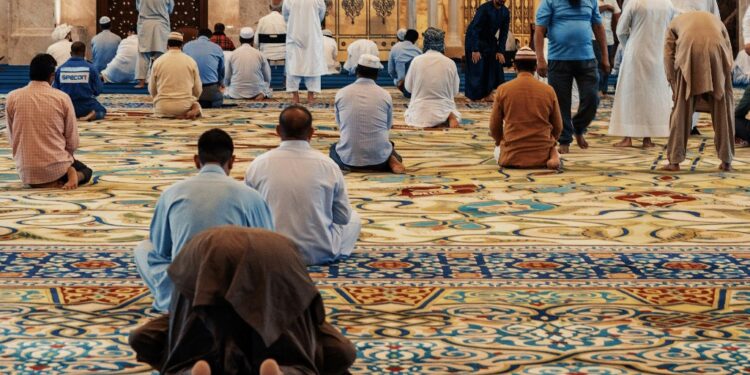Eid al-Adha, often referred to as the ‘Festival of Sacrifice’, holds profound significance in Islamic tradition. Its origins are deeply rooted in the story of Prophet Ibrahim (Abraham) and his unwavering commitment to God’s will. According to Islamic teachings, Prophet Ibrahim received a divine command in his dream to sacrifice his beloved son, Ismail (Ishmael), as a test of his faith and obedience. Despite the immense emotional challenge, Prophet Ibrahim prepared to fulfill God’s command, demonstrating his absolute devotion.
As the moment of sacrifice approached, God, in His infinite mercy, intervened and provided a ram to be sacrificed in Ismail’s place. This act of divine intervention is commemorated annually by Muslims worldwide, symbolizing the virtues of faith, sacrifice, and obedience. The event is recounted in the Quran, specifically in Surah As-Saffat (37:102-107), where God praises Ibrahim for his steadfastness and rewards him for his loyalty.
In addition to the Quranic account, numerous Hadiths also reference this significant event, further highlighting its importance in Islamic tradition. The Prophet Muhammad (peace be upon him) emphasized the commemoration of this event through the practice of Qurbani, or animal sacrifice, during Eid al-Adha. This ritual serves as a reminder of Ibrahim’s devotion and the importance of sacrificing personal desires for the greater good.
The historical narrative of Eid al-Adha is not just a tale of sacrifice but also a profound lesson in faith and trust in God’s wisdom. It underscores the importance of willingness to make personal sacrifices in the pursuit of spiritual growth and communal harmony. By annually reenacting this sacrifice, Muslims around the world reaffirm their commitment to these timeless values, ensuring that the spirit of Eid al-Adha continues to inspire generations.
Religious Practices and Rituals
Eid al-Adha, also known as the “Festival of Sacrifice,” holds profound significance in Islam, marked by a series of religious practices and rituals that embody its deeper spiritual meaning. Central to Eid al-Adha is the performance of special prayers, known as Salat al-Eid, which are held at the mosque. These prayers bring together the Muslim community in a collective act of worship, reinforcing the bonds of faith and unity. The Salat al-Eid is usually conducted in an open area or a large prayer hall, and it includes a sermon that underscores the values of sacrifice, obedience, and devotion to Allah.
Another pivotal ritual is the act of Qurbani, which involves the sacrifice of an animal, typically a sheep, goat, cow, or camel. This practice commemorates the willingness of Prophet Ibrahim (Abraham) to sacrifice his son Ismail (Ishmael) as an act of obedience to Allah. The Qurbani is carried out with meticulous care, and the meat is distributed in three parts: one-third is kept for one’s own family, another third is given to relatives and friends, and the final third is donated to those in need. This distribution embodies the spirit of charity, generosity, and communal harmony, ensuring that everyone, regardless of their financial status, partakes in the festive celebrations.
In addition to these religious duties, wearing new or the best clothes is a cherished tradition during Eid al-Adha. It symbolizes purification, renewal, and respect for the festive occasion. Muslims often dress in their finest attire to attend the Salat al-Eid and to visit friends and family, further enhancing the communal and celebratory atmosphere of the festival.
The communal aspects of Eid al-Adha are further highlighted through various social activities. Visiting friends and family, sharing meals, and exchanging gifts are common practices that strengthen social bonds and foster a sense of togetherness. These interactions not only celebrate the festival but also reinforce the values of compassion, empathy, and mutual support that are central to the Islamic faith.
Symbolic and Ethical Significance
Eid al-Adha holds profound symbolic and ethical significance within the Islamic tradition. Central to this celebration is the commemoration of the willingness of Prophet Ibrahim (Abraham) to sacrifice his son as an act of obedience to God. This ultimate act of devotion and submission is a powerful symbol of faithfulness and the readiness to surrender to divine will. The narrative emphasizes the importance of sacrifice, not merely in physical terms but also in the spiritual sense, encouraging believers to reflect on their own levels of devotion and commitment to their faith.
Additionally, Eid al-Adha is a time that underscores the values of charity and compassion. It is customary for Muslims to share the meat of the sacrificed animal with family, friends, and particularly with those who are less fortunate. This act of giving is a reminder of the blessings one has received and the duty to assist others, promoting a spirit of generosity and empathy within the community. The distribution of meat ensures that even the needy can partake in the festivities, embodying the principle of equity.
The festival also reinforces the principles of unity and community. During Eid al-Adha, Muslims gather for communal prayers and engage in shared celebrations, which foster a sense of belonging and togetherness. This collective observance enhances social bonds and reminds individuals of their interconnectedness within the Muslim Ummah (community). The shared experiences during this time serve to strengthen communal ties and foster a sense of solidarity among Muslims worldwide.
In essence, Eid al-Adha is not only a time for celebration but also a period for introspection and ethical reflection. It calls upon Muslims to consider their own acts of sacrifice and charity, to deepen their faith, and to reinforce their commitment to the welfare of the community. The festival’s enduring values of sacrifice, charity, and unity continue to inspire and guide Muslims in their spiritual and social lives.
Eid al-Adha Around the World
Eid al-Adha, also known as the “Festival of Sacrifice,” is celebrated by Muslims worldwide with a rich tapestry of cultural variations and unique traditions. In the Middle East, particularly in countries like Saudi Arabia and the United Arab Emirates, the celebration is deeply rooted in religious customs. Families gather for prayers at mosques and then proceed to perform the ritual slaughter of livestock, typically sheep or goats, in remembrance of Prophet Ibrahim’s willingness to sacrifice his son as an act of obedience to God. The meat is then distributed among family members, friends, and the less fortunate, exemplifying the spirit of charity and community.
In Africa, the festivities take on a vibrant and communal nature. In Nigeria, for instance, Eid al-Adha, locally known as “Sallah,” is marked by elaborate feasts, traditional music, and colorful attire. People often travel long distances to be with their loved ones, and community-wide celebrations are common. Similarly, in Egypt, the festival is celebrated with family gatherings, special meals, and the giving of gifts. The streets of Cairo and other cities buzz with activity as people visit markets to buy new clothes and special treats for the occasion.
Asian countries also have their own unique ways of observing Eid al-Adha. In Indonesia, the world’s largest Muslim-majority country, the day begins with a special prayer and continues with the Qurban, or animal sacrifice. The meat is shared among family, friends, and the needy, ensuring that everyone partakes in the joy of the festival. In South Asia, particularly in Pakistan and India, the day is marked by community prayers, festive meals, and a sense of togetherness. The traditional dishes prepared for Eid al-Adha, such as biryani and kebabs, add a culinary richness to the celebrations.
In Western countries, where Muslims are a minority, Eid al-Adha is often celebrated with a focus on community and inclusivity. Mosques and Islamic centres organize special events, communal prayers, and charity drives. Families come together to share meals and exchange gifts, maintaining their cultural heritage while integrating into the broader society. The COVID-19 pandemic has, however, altered the way Eid al-Adha is celebrated globally. Restrictions on gatherings and travel have led to smaller, more intimate celebrations, with a greater emphasis on virtual connections and online charity initiatives.
Despite these contemporary challenges, the essence of Eid al-Adha remains unchanged – a time for reflection, gratitude, and community. The diverse ways in which the festival is celebrated worldwide highlight the rich cultural tapestry of the global Muslim community, united by faith and tradition.











